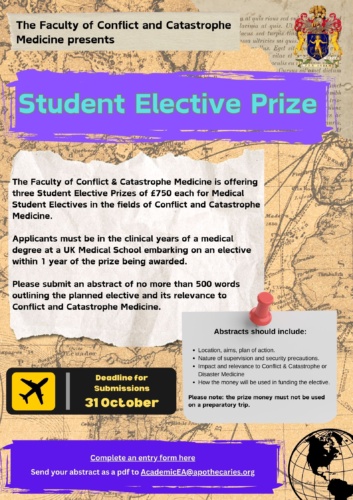Student Elective Prizes
**Entries for 2024 Open Thursday 1 August**
The Faculty of Conflict & Catastrophe Medicine is offering three Student Elective Prizes of £750.00 each for Medical Student Electives in the fields of Conflict and Catastrophe Medicine.
Applicants must be in the clinical years of a medical degree at a UK Medical School embarking on an elective within 1 year of the prize being awarded.
Please submit an abstract of no more than 500 words outlining the planned elective and its relevance to Conflict and Catastrophe Medicine.
Abstracts should include:
- Location, aims, plan of action.
- Nature of supervision and security precautions.
- Impact and relevance to Conflict & Catastrophe or Disaster Medicine
- How the money will be used in funding the elective.
Please note: the prize money must not be used on a preparatory trip.
The Deadline for submissions is midnight, Thursday 31 October
The winners will be required to make a brief presentation to the Faculty after they have completed their electives.
Complete the 2024 Application Form Here
Please submit your abstract as a .pdf file to AcademicEA@apothecaries.org

Past Prize Winners
2023
- Isobel Greenwood: Emergency medicine and Critical Care at the Tamakoshi hospital in the district of Manthali, Nepal
- Jessica Bunting: UK Military Medicine at Queen Elizabeth Hospital Birmingham
- Angelina Malcher: The Amazon Hope Medical Programme in the Peruvian Amazon.
2022
- Molly Abbott: Medical Volunteer at the Orosa land clinic, on the Orosa River situated within the Amazon Rainforest, Peru.
- Katharina Beck: Medical Volunteer at the Orosa land clinic, on the Orosa River situated within the Amazon Rainforest, Peru.
- Mohammed Khan: Elective at the St John of Jerusalem Eye Hospital and Occupied Palestinian Territories.
2021
No awards given due to cancelled electives as a result of Covid-19 pandemic.
2020
No awards given due to cancelled electives as a result of Covid-19 pandemic.
2019
1. Catherine Ward: Elective at the Emergency Department at the Nazareth Hospital, Nazareth, Israel
2. Jessica Lee: Sexual and reproductive healthcare services to displaced Congolese in Western Uganda
3. Lottie Brown: Fungal Keratitis in Nepal: Preventing Blindness Through Education and Distribution of Protective Equipment
2018
1. Mazen Allam: A prospective review of short term outcomes of abdominal gunshot wounds presenting with signs of sepsis and septic shock.
2. Farhaan Khan: Elective at the Children's Surgical Centre in Phnom Penh, Cambodia.
3. Dena Ettehad: Maternal and Child Health Service Delivery for Syrian Refugees Living in the informal Settlements of the Bekaa Valley, Lebanon.
2017
1. Caroline Apsey/David Song/Rebecca Haddow: MSP: providing vulnerable Pacific women and children with reproductive healthcare after sexual assault and in disaster situations
2. Hannah Scott: refugee assistance and health promotion, Lesbos, Greece
3. Roxanne Tajbakhsh: training disaster medicine trainers & refugee camp project
2016
1. Zaamin Hussain/Matthew Walton: Global Charity Naya Qadam in Bangladesh
2. Kajann Prathapan: Centre for Victims of Torture in Minnesota
2015
Valmir Selimi: Surgical elective at the Cambodia Children's Surgical Centre in Phnom Penh
2014
Thomas Lemon: Psychiatric impact of forced scarring on ex child soldiers
2013
1. Frances Yarlett: Demographic Health Survey in Ratanakiri, Cambodia
2. Husain Khaki: The impact of HAART availability on TB-HIB in South Africa and India
2012
Jonathan Broad: Child Health teaching project in the occupied Palestinian Territories
2011
David MacGarty: Rehabilitation of Abducted Children in Gulu Province (Northern Uganda)
Student Elective Prizes
The Faculty of Conflict & Catastrophe Medicine offers 3 annual student elective prizes worth £750.00 each for medical student electives in the fields of Conflict and Catastrophe Medicine.
Applicants must be in the clinical years of a medical degree at a UK medical school embarking on an elective within 1 year of the prize being awarded.
Candidates are required to submit an abstract of no more than 500 words outlining the planned elective and its relevance to Conflict and Catastrophe Medicine.
Abstracts should include:
Location, aims, plan of action.
Nature of supervision and security precautions.
Impact and relevance to Conflict & Catastrophe or Disaster Medicine
How the money will be used in funding the elective. Please note: the prize money must not be used on a preparatory trip.
The winners will be required to make a brief presentation to the Faculty after completion of the elective.

